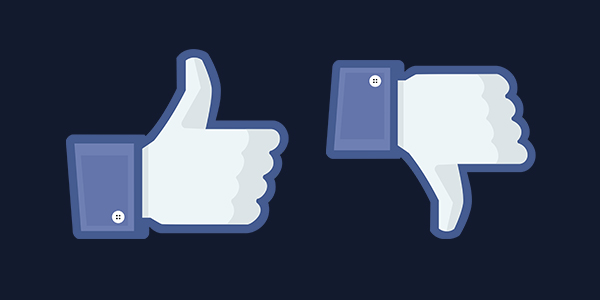Facebook unveils plan for a ‘dislike’ button

Facebook co-founder and CEO Mark Zuckerberg announced that Facebook will soon release a button that lets users “sympathize” last Tuesday during a livestream Q&A session from Facebook headquarters in Menlo Park.
In earlier years, Facebook has been reluctant to build a “dislike” button out of fear that Facebook will turn into a forum where people are “voting up or down” on other people’s posts.
In spite of that, Zuckerberg is now amenable to the idea of a “dislike” button that helps convey support or solidarity. When people post about tragic moments in their life, users often become stuck in a conundrum: it seems inappropriate to like the post, but they still want to express their support for the poster.
“Over the years of people asking for this, what we kind have come to understand is that [what] the people really want to express is empathy,” Zuckerberg said in the Q&A. “Not every moment is a good moment.”
The unveiling of the plan for the “dislike” button generated mixed reactions among the student body. Some students echoed Zuckerberg’s sentiments, while others felt that the button would generate negativity or disagreed with Zuckerberg’s intended purpose for the button.
Alexander Henshall (12) felt that the Zuckerberg’s portrayal of the “dislike” button mismatched its actual purpose.
“I think the way Mark Zuckerberg worded it was very interesting,” he said. “I just always assumed that a dislike button was meant to show disapproval, sort of like ‘Oh, that shouldn’t have been said.’”
Other students felt that the button could be used as a tool for giving and receiving criticism.
“They’re not trying to insult people with a dislike button,” Gary Tsai (10) said. “I think the dislike button will only be for criticism, and especially [for] student council ideas, I think that would be a good way to pioneer criticism.”
Students also looked at the possible consequences for the Harker community with the “dislike” button.
“Though it’ll probably have a positive effect because everyone will know what everyone else is feeling, it might hurt people when they see that their post has been disliked,” Jacqueline He (10) said. “It kind of ruins their self-esteem a little bit.”
Zuckerberg announced that the button is almost ready for testing, and users may soon have a way to empathize without using the “like” button.

Kaitlin Hsu (11) is the Editor-in-Chief of Wingspan Magazine. In her freshmen year, she was a reporter, and in her sophomore year, she was the Features...


















![“[Building nerf blasters] became this outlet of creativity for me that hasn't been matched by anything else. The process [of] making a build complete to your desire is such a painstakingly difficult process, but I've had to learn from [the skills needed from] soldering to proper painting. There's so many different options for everything, if you think about it, it exists. The best part is [that] if it doesn't exist, you can build it yourself," Ishaan Parate said.](https://harkeraquila.com/wp-content/uploads/2022/08/DSC_8149-900x604.jpg)




![“When I came into high school, I was ready to be a follower. But DECA was a game changer for me. It helped me overcome my fear of public speaking, and it's played such a major role in who I've become today. To be able to successfully lead a chapter of 150 students, an officer team and be one of the upperclassmen I once really admired is something I'm [really] proud of,” Anvitha Tummala ('21) said.](https://harkeraquila.com/wp-content/uploads/2021/07/Screen-Shot-2021-07-25-at-9.50.05-AM-900x594.png)







![“I think getting up in the morning and having a sense of purpose [is exciting]. I think without a certain amount of drive, life is kind of obsolete and mundane, and I think having that every single day is what makes each day unique and kind of makes life exciting,” Neymika Jain (12) said.](https://harkeraquila.com/wp-content/uploads/2017/06/Screen-Shot-2017-06-03-at-4.54.16-PM.png)








![“My slogan is ‘slow feet, don’t eat, and I’m hungry.’ You need to run fast to get where you are–you aren't going to get those championships if you aren't fast,” Angel Cervantes (12) said. “I want to do well in school on my tests and in track and win championships for my team. I live by that, [and] I can do that anywhere: in the classroom or on the field.”](https://harkeraquila.com/wp-content/uploads/2018/06/DSC5146-900x601.jpg)
![“[Volleyball has] taught me how to fall correctly, and another thing it taught is that you don’t have to be the best at something to be good at it. If you just hit the ball in a smart way, then it still scores points and you’re good at it. You could be a background player and still make a much bigger impact on the team than you would think,” Anya Gert (’20) said.](https://harkeraquila.com/wp-content/uploads/2020/06/AnnaGert_JinTuan_HoHPhotoEdited-600x900.jpeg)

![“I'm not nearly there yet, but [my confidence has] definitely been getting better since I was pretty shy and timid coming into Harker my freshman year. I know that there's a lot of people that are really confident in what they do, and I really admire them. Everyone's so driven and that has really pushed me to kind of try to find my own place in high school and be more confident,” Alyssa Huang (’20) said.](https://harkeraquila.com/wp-content/uploads/2020/06/AlyssaHuang_EmilyChen_HoHPhoto-900x749.jpeg)


